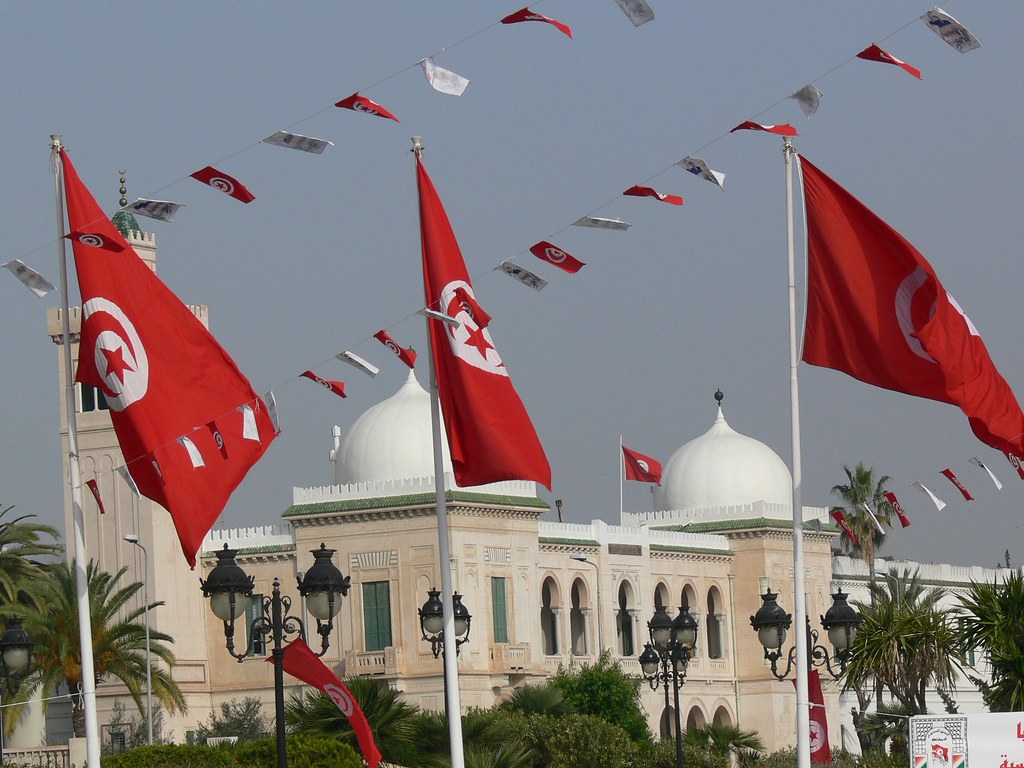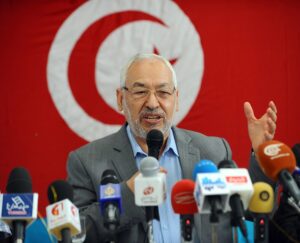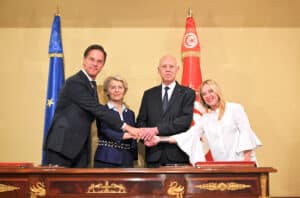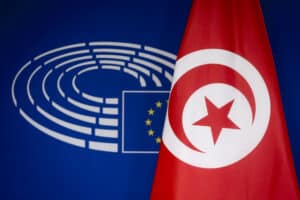After more than a month of tense negotiations Prime Minister-designate, Habib Jemli, announced his new government line-up on 2 January, with a vote of confidence regarding the proposed government to be held on January 10. According to the assistant speaker, Nesrine La âmari, the date was chosen by Ennahdha and Qalb Tounes while the Democratic Bloc and the Free Destourian Party preferred 7 January. The Jemli government must be supported by a majority of the parliament before it can take office. Jemli said his proposed cabinet is compiled of technocrats who were chosen based on their competence and independent position from political parties. Jemli announced that relatively unknown Abderrahmen Khachtali would be finance minister, whose main task will be to revive the weak Tunisian economy. The current minister of Tourism, Rene Trabelsi, is the only one to remain on his post in the new government.
It remains to be seen whether the government of Jemli can pass the vote of confidence, since the parliament has been fragmented following the parliamentary elections of October. During the formation talks Jemli struggled to bring together rival parties, but he claimed that his new government will gather support from all relevant political parties. In the coming days many political parties scheduled council meetings to determine the position of the party and its parliamentary bloc in the vote of confidence session.
Ennahdha decides to endorse the proposed government
The executive council of the Ennahdha movement, the so-called Shura Council, decided on 5 January to endorse the government proposed by Jemli. This was announced by the council’s chairman Abdelkrim Harouni at a press conference. However Harouni added that the movement may have reservations about certain names on the list but will consult with Jemli to address possible changes to the line-up. While adding that his party doesn’t intend to put pressure or blackmail Jemli, but urged him to review some names in accordance with the constitution and legal procedures in force. Finally Harouni claimed that the party chose to give its vote of confidence in the new government despite its reservations in order to move Tunisia forward after the prolonged political stalemate.
Meanwhile the Ennahdha party is struggling with internal problems, as the term of Ennahdha leader Ghannouchi is nearing its end. The party structure prohibits Ghannouchi from becoming the leader for a third four-year consecutive term. Already, signs of a struggle for power within the party are beginning to show with party members from the reformist wing of Ennahda expressing their concerns over the lack of progress being made to hold a party conference. One of those reformist members, Abdullatif Mekki, said there had been unusual calls from party members that suggest bypassing the party laws to extend Ghannouchi’s reign over the party. Tunisia’s biggest and strongest party could end up in an internal power struggle during one of the most crucial years of democratic Tunisia.
Negative reactions of other parliamentary blocs
The National Reform Bloc (15 seats), which consists from Machrou Tounès, Nidaa Tounès, Al Badil, Afek Tounes and 3 independent candidates, raises questions about the independent nature and competence of the new government. With President of the National Reform group, Hssouna Nasfi, not ruling out the possibility of making changes to the list, as he states that overall the National Reform group deems the proposed government as unsatisfactory. Another big parliamentary group, the Al Karama or Dignitiy Coalition (21 seats), announced through their deputy, Abdellatif Aloui, it would not vote in favor of the Jemli government. Describing the proposed composition as a “mending government”. Aloui stressed that the Al Karama bloc is especially concerned with the proposed Minister of Tourism, Minister of International Cooperation, Secretary of Minister of Health and Secretary for Economic Diplomacy, citing doubts about their independency as main argument for the distrust in these ministers. On the other hand, Aloui acknowledged that a minority within the bloc prefers to accept the Jemli government in order to move forward.
The second largest party Qalb Tounes (38 seats), will also vote against the new government, with Qalb Tounes president Nabil Karoui claiming that members of the government team are Ennahdha members. Karoui said that if no changes are made in the composition before next Friday, his parliamentary bloc will vote against the list established by Jemli. Meanwhile the leader of Qalb Tounes, Hatem Mliki, proclaimed on 5 January that his party in principle trusts the new government and a meeting on the party’s definitive position on the vote of confidence will take place before Friday. It looks like the stance of Qalb Tounes could still change in the buildup to the vote on January 10. Furthermore, the Al Soumoud Coalition and Tahya Tounes decided to vote against the Jemli government, both cited doubts about the independence and competence of proposed ministers as their reason for their position on the vote of confidence. Zouhaier Maghzaoui, a deputy from the Echaâb movement, said that the democratic parliamentary bloc (41 seats), made up of Echaab and the Democratic movement, will not give its confidence to the proposed government. As he argues, like other MPs, that it’s a government mainly compromised of Ennahda and Qalb Tounes members.
Ennahdha working around the clock to prevent no confidence vote
With many parties proclaiming their lack of confidence in the Jemli government before the vote on 10 January, it looks highly unlikely that the new government will reach the required majority in the vote. According to Zouhair Maghazoui, leader of the Echaâb movement, Ennahda wanted the 10 January deadline to give the party time to rally support from parliamentary blocs. Continuing, Maghazoui told reporters that Ennahda is holding a marathon of backstage meetings with a variety of deputies from all parliamentary blocs. Maghazoui said he was astonished by the fact that Jemli announced his government without ensuring enough support from the parliamentary members. Ennahdha will hope to convince parliamentary blocs or persuade members of parliament to vote against their party’s position. With many Tunisian being fed up with the current political stalemate, the pressure on reluctant political parties increases, with Ennahdha hoping to benefit from this by successfully pushing through the Jemli government on 10 January. For now, persuading Qalb Tounes and the Al Karama coalition looks like the most achievable option for Ennahdha, in order to obtain a majority for the confidence vote session.
If the new government fails to get a majority in the vote of confidence session of 10 January, president Saied will appoint a new candidate for Prime Minister, who will be tasked with forming a new government. This new candidate will probably be an independent technocrat, as currently any affiliation with a political party is complicating the formation process. 10 January will be an important day for the future of Tunisia, especially as the weak economy needs decisive action from a stable government and the political deadlock is sparking anger among young Tunisians.
Sources: Aljazeera TAP1 TAP2 Middleeasteye Al-Monitor



